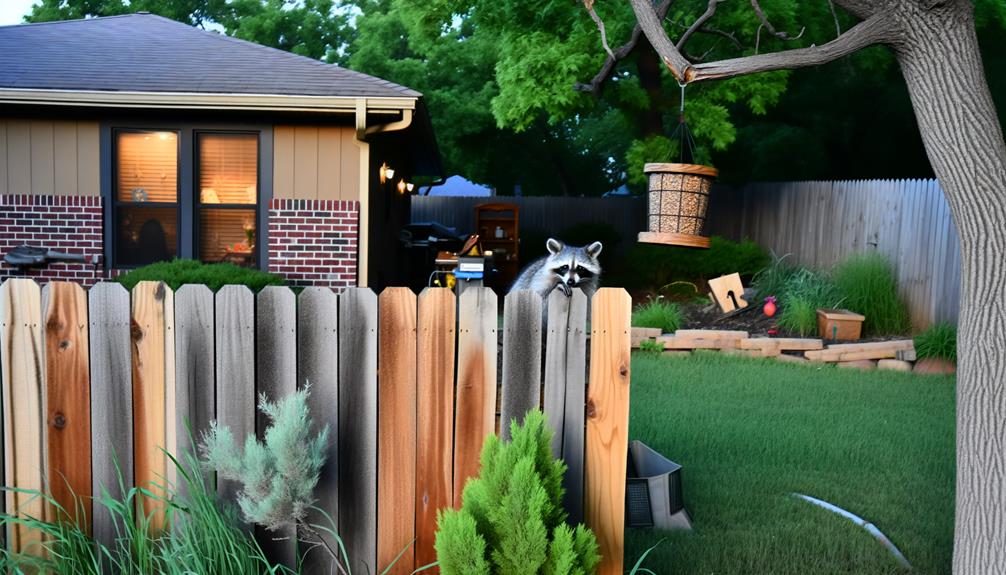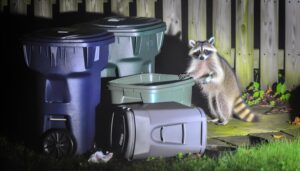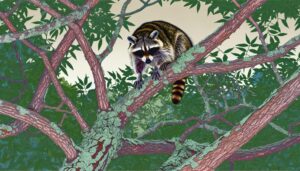How You Can Have a Pet Raccoon in Kansas
In Kansas, owning a pet raccoon is tightly regulated by state and local laws to safeguard public health and the environment. The Kansas Department of Wildlife, Parks, and Tourism mandates obtaining a Captive Wildlife Permit, which requires extensive documentation and compliance with standards for housing, diet, and veterinary care.
Raccoons are classified as wildlife, posing risks such as disease transmission and potential aggressive behavior. Permit applications can be complex and time-consuming, underscoring the state's commitment to responsible pet ownership.
For those considering raccoon ownership, understanding the detailed legal and care requirements is vital. Learn about the specifics and implications involved.

Key Takeaways
- Owning a pet raccoon in Kansas is legal with a Captive Wildlife Permit.
- The Kansas Department of Wildlife, Parks, and Tourism regulates raccoon ownership.
- Permit application requires detailed documentation on housing, care, and veterinary plans.
- Raccoons are classified as wildlife, subject to stringent regulations and disease control measures.
- Violating raccoon ownership laws can result in fines and criminal charges.
Kansas Exotic Pet Laws
Kansas exotic pet laws are governed by a combination of state statutes, regulations, and local ordinances designed to guarantee public safety and animal welfare. The Kansas Department of Wildlife, Parks, and Tourism (KDWPT) serves as the primary regulatory body overseeing the possession of exotic animals. Regulations stipulate that specific species require permits, which involve a rigorous application process that assesses the potential risks to humans and ecosystems.
Local ordinances may impose additional restrictions or outright bans on certain exotic pets. Compliance with these laws is critical to ensure the humane treatment of animals and to prevent the spread of diseases. Additionally, these regulations aim to mitigate the risk of invasive species disrupting local wildlife populations and ecosystems.
Legal Status of Raccoons
Among the various exotic animals regulated in Kansas, the legal status of raccoons specifically warrants detailed examination due to their unique characteristics and potential impact on both human and ecological health. Raccoons are classified as both wildlife and potential nuisance animals, resulting in stringent regulations concerning their captivity and care.
This classification stems from their capability to transmit diseases such as rabies and their propensity for causing ecological disruptions. Kansas law mandates that individuals must adhere to specific guidelines to legally possess raccoons, reflecting the state's commitment to public safety and environmental conservation. These regulations are designed to mitigate risks associated with improper handling and to preserve local biodiversity, underscoring the importance of responsible wildlife management.
Licensing Requirements
To legally possess a pet raccoon in Kansas, prospective owners must navigate a thorough licensing process designed to guarantee both public safety and animal welfare. The Kansas Department of Wildlife, Parks, and Tourism (KDWPT) mandates that individuals obtain a Captive Wildlife Permit. This permit is essential for ensuring that the raccoon is housed and cared for in conditions that meet stringent standards.
Requirements include providing detailed information about the animal's enclosure, diet, and veterinary care. Additionally, prospective owners must demonstrate adequate knowledge of raccoon behavior and health management. This extensive approach aims to mitigate potential risks associated with keeping a wild animal as a pet, thereby safeguarding both the community and the animal itself.
Permit Application Process
The permit application process for keeping a pet raccoon in Kansas involves several critical steps.
Beginning with the collection and submission of required documentation such as proof of proper housing and veterinary care. Applicants must follow specific submission procedures to guarantee their applications are complete and accurate.
Once submitted, the approval timeline can vary, typically ranging from several weeks to a few months, depending on the thoroughness of the initial application and the current backlog of requests.
Required Documentation Details
Obtaining a permit to keep a pet raccoon in Kansas requires the submission of specific documentation. This includes proof of rabies vaccination and a detailed enclosure plan. The rabies vaccination certificate must be issued by a licensed veterinarian to guarantee the raccoon's health and public safety.
The enclosure plan should provide a detailed layout indicating the dimensions, materials used, and security measures to prevent escape or injury. Additionally, applicants must submit a health certificate for the raccoon, verifying it is free from contagious diseases.
Documentation should also include a care plan detailing feeding, exercise, and enrichment strategies. Ensuring the thoroughness of these documents helps protect the well-being of both the raccoon and the community.
Application Submission Steps
Once all necessary documentation is prepared, applicants must follow a structured process to submit their permit application for keeping a pet raccoon in Kansas.
Initially, the completed application form, along with all supporting documents, should be submitted to the Kansas Department of Wildlife, Parks, and Tourism (KDWPT). It is crucial to confirm that all information is accurate and complete to avoid delays.
The application must be accompanied by the required fee, which varies depending on the permit type. Applicants are advised to retain copies of all submitted materials for their records.
Once the application has been received by KDWPT, it will undergo a thorough review process to verify compliance with state regulations.
Approval Timeline Overview
How long does the permit application process take for keeping a pet raccoon in Kansas?
The timeline for obtaining a permit involves several stages, beginning with the submission of a detailed application form to the Kansas Department of Wildlife, Parks, and Tourism. Typically, the evaluation of the application, including background checks and verification of compliance with housing and care standards, takes approximately 4 to 6 weeks.
Following this, a site inspection is conducted to make sure the prospective raccoon habitat meets all regulatory requirements. Post-inspection, the final review and issuance of the permit generally require an additional 2 to 3 weeks.
Therefore, applicants should anticipate an overall timeline of 6 to 9 weeks for the entire approval process.
Housing and Care Standards
Ensuring appropriate housing and care standards for pet raccoons in Kansas involves adhering to specific enclosure requirements and implementing essential care practices. Proper enclosures must provide adequate space, security, and environmental enrichment to meet the raccoon's physical and psychological needs.
Essential care practices include a balanced diet, regular veterinary check-ups, and opportunities for socialization and exercise.
Proper Enclosure Requirements
To guarantee the well-being and safety of a pet raccoon in Kansas, it is important to design an enclosure that meets specific housing and care standards. A well-constructed enclosure safeguards the raccoon while providing an environment conducive to its natural behaviors.
Key considerations include:
- Space: The enclosure must be spacious enough to allow the raccoon to climb, forage, and exercise, ideally exceeding 100 square feet.
- Security: Robust materials are necessary to prevent escapes, with secure latches and reinforced fencing.
- Environmental Enrichment: Include elements like branches, water features, and hiding spots to simulate a natural habitat.
Essential Care Practices
When caring for a pet raccoon in Kansas, it is vital to adhere to detailed housing and care standards to promote the animal's health and well-being. An ideal enclosure should provide ample space, vertical enrichment, and secure barriers to prevent escape.
Temperature regulation is essential; maintain an ambient temperature between 65-75°F. Diet must be nutritionally balanced, incorporating fruits, vegetables, protein sources, and specialized raccoon feed.
Regular veterinary check-ups are necessary to monitor health and prevent zoonotic diseases. Enrichment activities, such as puzzle feeders and interactive toys, are required to stimulate cognitive functions and minimize stress.
Health and Safety Concerns
Understanding the health and safety concerns associated with keeping a pet raccoon in Kansas is essential for ensuring both human and animal well-being. Raccoons are known carriers of various zoonotic diseases, which can pose significant risks to humans. Additionally, their behavior can sometimes be unpredictable, leading to potential injuries.
- Disease Transmission: Raccoons can carry rabies, roundworms, and leptospirosis, which can be transmitted to humans and other pets.
- Aggressive Behavior: Even domesticated raccoons may exhibit aggressive tendencies, especially when stressed or threatened.
- Environmental Hazards: Raccoons are adept climbers and diggers, potentially causing structural damage to homes and yards.
Addressing these issues requires careful consideration and adherence to health and safety protocols to protect both the raccoon and its human companions.
Potential Legal Penalties
Owning a pet raccoon in Kansas can subject individuals to substantial legal penalties, including fines and potential imprisonment. These legal consequences stem from state wildlife regulations designed to protect both the ecosystem and public health.
Non-compliance with these laws may result in severe repercussions, highlighting the importance of understanding and adhering to local wildlife statutes.
Fines and Penalties
Violating Kansas state laws regarding the ownership of raccoons can result in significant fines and legal penalties. The Kansas Department of Wildlife, Parks, and Tourism (KDWPT) enforces strict regulations to protect both wildlife and public safety.
Penalties for unauthorized ownership may include:
- Fines: Monetary penalties can range from a few hundred to several thousand dollars, depending on the severity of the violation.
- Seizure of the Animal: Authorities may confiscate the raccoon, placing it into wildlife rehabilitation or euthanizing it if deemed necessary.
- Criminal Charges: Offenders may face misdemeanor or felony charges, leading to potential jail time and a permanent criminal record.
These measures underscore the importance of adhering to state wildlife regulations for the wellbeing of both humans and animals.
Legal Consequences
Given the stringent regulations enforced by the Kansas Department of Wildlife, Parks, and Tourism (KDWPT), individuals owning a raccoon without proper authorization can face severe legal consequences. Unauthorized possession of a raccoon is classified as a misdemeanor in Kansas. Convicted individuals may incur fines up to $1,000 and potential jail time. Additionally, violators could be subject to probation and mandatory community service.
The raccoon, being classified as a wild animal, poses public health risks, including the transmission of zoonotic diseases. Consequently, the KDWPT may also seize the animal, leading to its relocation or euthanasia. Adherence with these regulations maintains public safety and the well-being of wildlife, underscoring the importance of following legal guidelines.
Responsibilities of Ownership
Ensuring the well-being of a pet raccoon in Kansas necessitates a thorough understanding of both legal requirements and the species' unique behavioral and physiological needs. Raccoons require a specialized diet, access to veterinary care, and an environment that stimulates their natural behaviors. Meeting these needs involves considerable time, effort, and financial resources.
- Dietary Needs: A balanced diet includes fruits, vegetables, proteins, and occasional supplements to mimic their natural diet.
- Veterinary Care: Regular check-ups and vaccinations are essential to prevent diseases and maintain overall health.
- Enrichment: Providing toys, climbing structures, and problem-solving activities is vital to prevent boredom and destructive behavior.
Owning a raccoon is a commitment that demands significant responsibility and dedication.
Alternatives to Pet Raccoons
For individuals interested in exotic pets but hesitant about the complexities of raccoon ownership, there are several alternative animals that may be more suitable.
Sugar gliders are small, nocturnal marsupials requiring minimal space and providing companionship through their social nature.
Hedgehogs, though prickly, are low-maintenance and can form strong bonds with their owners.
Ferrets offer playful interactions and are relatively easy to care for, given proper housing and stimulation.
Additionally, reptiles such as bearded dragons or leopard geckos demand specific but manageable environmental conditions, making them suitable for dedicated caretakers.
Each of these alternatives presents unique care requirements and benefits, potentially offering a more feasible option for those drawn to the allure of exotic pets without the high demands of raccoon ownership.
Resources for Pet Owners
When considering the responsibilities of pet ownership, it is important to be aware of the resources available to support the health and well-being of exotic animals. Ensuring proper care requires access to specialized services and informed guidance.
Kansas offers a range of resources for exotic pet owners, including:
- Veterinary Services: Locate veterinarians experienced in treating exotic animals to address specific health needs.
- Educational Materials: Utilize books, online courses, and seminars focused on the care of raccoons and other exotic pets.
- Support Networks: Engage with local and online communities of exotic pet owners to share experiences and advice.
These resources are invaluable in providing the knowledge and support necessary to maintain the health and happiness of your pet raccoon.
Conclusion
To wrap up, Kansas law governs the ownership of raccoons through specific licensing requirements, a detailed permit application process, and stringent housing and care standards. Failure to adhere to these regulations can lead to significant legal penalties.
The responsibilities of ownership are substantial, emphasizing the importance of informed decision-making. Alternatives to owning a pet raccoon should be thoroughly evaluated.
Extensive resources are available for potential pet owners, aiding in compliance with legal requirements and advocating for ethical treatment of exotic animals.






